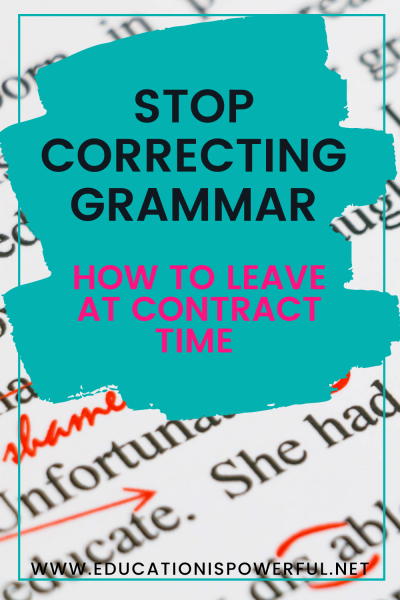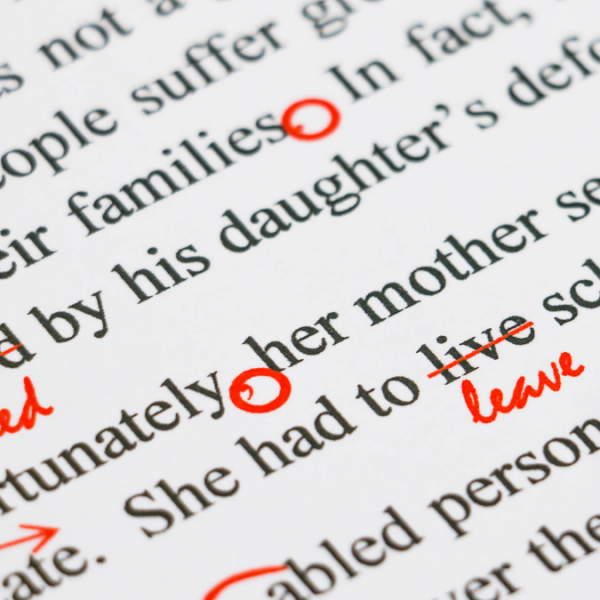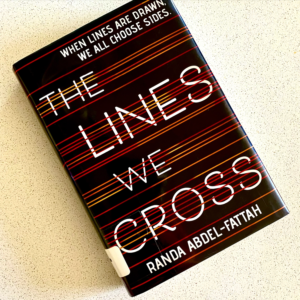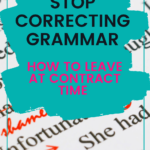What happens when we don’t stop correcting grammar
Imagine this … (or perhaps you lived this just this last week.)
You brainstormed, outlined, drafted, did peer reviews, had parents give feedback, and now students have submitted their final drafts. And now you are grading papers, and grading, and grading – oh the stacks of papers.
And you get to a paper and that student has run-on sentences, uses the wrong verb tense, misses a comma in their citations. And you with your trusty purple pen (because we don’t use red anymore) start correcting the grammar.
I am going to urge you right now to stop – don’t do that. Put the pen down and think about why you are doing it.
If you are doing this because you want to show them (and maybe you are a little bit angry because a 10th grader should know to capitalize “I” – hey no judgment, I’ve been there) – you are wasting your time.
If you are doing this because you want students to learn grammar rules – you are wasting your time. They won’t learn grammar rules by looking at your editing marks. They probably don’t even know that they need a subject after that conjunction to use a comma – let’s be honest, they probably don’t even know which word is the conjunction.
Now imagine this … you are a student and you get your essay back. The front has the rubric and your grade. You look at the grade, maybe read the comments, flip through the paper, and then throw it in the trash (or put it in your backpack to have your mom toss it later).
Was the time you spent correcting grammar worth it?
Probably not.
What you should do instead
Too often as teachers, we spend a lot of time on things that have very little impact on student learning, and I think correcting grammar is one of them.
So what should we do instead?
1. Grade using a rubric.
Yes, I think that grammar should factor into the overall grade of an essay. It is in the common core standards after all. However, grading for grammar is not the same as correcting grammar.
I use a mastery-based grading rubric tied to standards. To be marked proficient in L.2 (aka grammar), my rubric says,
“Few errors. The writer shows a command over a variety of conventions.”
That’s all. Not perfect. Who’s perfect? I probably have grammar mistakes in this blog post. I certainly don’t expect a teenager to be perfect. When I started teaching AP Lang, it changed the way I graded. The AP rubrics (at the time) said that writing should be free from basic errors or any errors that detracted from the meaning of the essay.
I also want my students to show a variety of conventions – meaning that they shouldn’t write in only simple sentences. I want to see commas, semicolons, colons. I want to see different types of transitions and ways to embed quotes and facts fluidly. In the AP world, they called it “sophistication” when describing high scores on essays.
So, when students would have comma splices and incomplete sentences, I would note it in my head (because come on, I can’t help myself), but if it didn’t hinder the meaning behind the text, I moved on. If I saw a student who continually had issues, I would write on the rubric something like, “work on your comma use” and score them an “Approaching Proficiency” score and move on.
I bet this has also happened to you. You correct and correct a student’s paper. And then the student asks to revise and you are so excited. Only to have the student turn in the exact same paper, but with your corrections made. That’s it. No actual revising. Just editing. And the student now thinks that they deserve an A, even though they may have many other issues in the writing.
This happens because we have put so much emphasis on grammar. Students see all the purple marks and think – that is why they got a poor grade, when in reality it may be because they can’t use relevant evidence.
2. Instead, spend your time with writing conferences.
Writing conferences address individual student needs when it comes to grammar, using their own writitng. That makes much more impact on student writing than simply marking their mistakes on an essay.
I always did mine during the writing workshop (more on that in upcoming posts).
3. Use intervention time to teach grammar.
If you are lucky enough to work in a school with a dedicated intervention time – use this to your advantage. Make a note of common errors your students are making and work with them in a small group to reteach. Your students will learn so much more in this format than they would be looking at your grammar marks on their essays.
Save your sanity and your time
Helping students draft quality essays in class will shorten your grading time considerably. And when you stop correcting grammar, you will save oodles of time.
And encourage quality writing, rather than simply editing from students.
But more importantly, you won’t dread grading essays. You’ll breeze through them and be able to spend your time in activities that will help students learn writing in much more effective ways.
In the last few years, as I have adopted the practice of not correcting grammar on essays, I have been able to leave at contract time. Even when teaching over 100 tenth graders. Even when teaching AP Lang. Even when it was the end of the quarter.
Try it out the next time your students turn in their essays.




